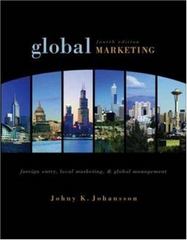Question
Question: 1.) If people wanted to do business in Mexico, of the following 5 options, which would be the top two choices for entering their
Question:
1.) If people wanted to do business in Mexico, of the following 5 options, which would be the top two choices for entering their market/country? Explain the reasoning for each of the top 2 choices. ( if it helps in answering this question, could usage of a specific type of business when referencing the top 2 choices. ) Choices: a.) Exports b.) Licensing c.) Franchising d.) Joint Venture e.) Foreign Direct Investment
2.) A.) If a person is going to do business in a country that has the following 5 characteristics: 1.) High Power Distance 2.) Ethnocentric 3.) Monochromic Culture 4.) High Context Culture 5.) Individualist Culture ( some of these refer to Value Dimensions relating to Global Business ) What challenges or potential problems could they face with each of these characteristics? Or, are they likely to pose no problem for them? Explain thoroughly. B.) Overall, what is the importance of cross-cultural understanding in having a successful global business experience? How could they gain cross-cultural understanding before they actually go into business in another country? Explain.
3.) A.) Discuss the reasons why some country's currencies are worth more relative to other currencies. Why do some suggest that China's currency, the Yuan, should be a higher value in foreign exchange markets than it currently is? Is there an advantage for China to keep the value of their currency lower? Explain Why, or Why not. B.) Exchange rates can vary daily and add to trading costs. To make trade easier between countries, do you think we will ever have a common currency between all countries ( a single global currency )? Why, or Why not? Explain.
4.) The two primary options for raising financial capital ( funds ) in global markets are stocks and bonds. Who can sell stocks and bonds and why do " they " do so? How are these two different options ( stocks and bonds ) different from each other as way to raise funds? How are they similar to each other? What are some of the advantages and disadvantages of trying to raise funds in global financial markets versus just domestic markets? Explain thoroughly.
5.) Your employee, RabbCo., is sending some of its employees to predominantly Muslim countries. In order to help your colleagues conduct business in a culturally sensitive manner. Explain, discuss and introduce to your colleagues about Islam in the following:
A.) Introduction to Islam in general including the concept of unity ( or " tawhid " ), The Qur'an, the Hadith ( What is expected of a Muslim as communicated by God through Gabriel to Muhammad - May Peace be Upon Him ), the idea of Mercy, and the importance of understanding Islam in general, especially to non-Muslims.
B.) Islam and Business Ethics and Islamic Economics.




Step by Step Solution
There are 3 Steps involved in it
Step: 1

Get Instant Access to Expert-Tailored Solutions
See step-by-step solutions with expert insights and AI powered tools for academic success
Step: 2

Step: 3

Ace Your Homework with AI
Get the answers you need in no time with our AI-driven, step-by-step assistance
Get Started


